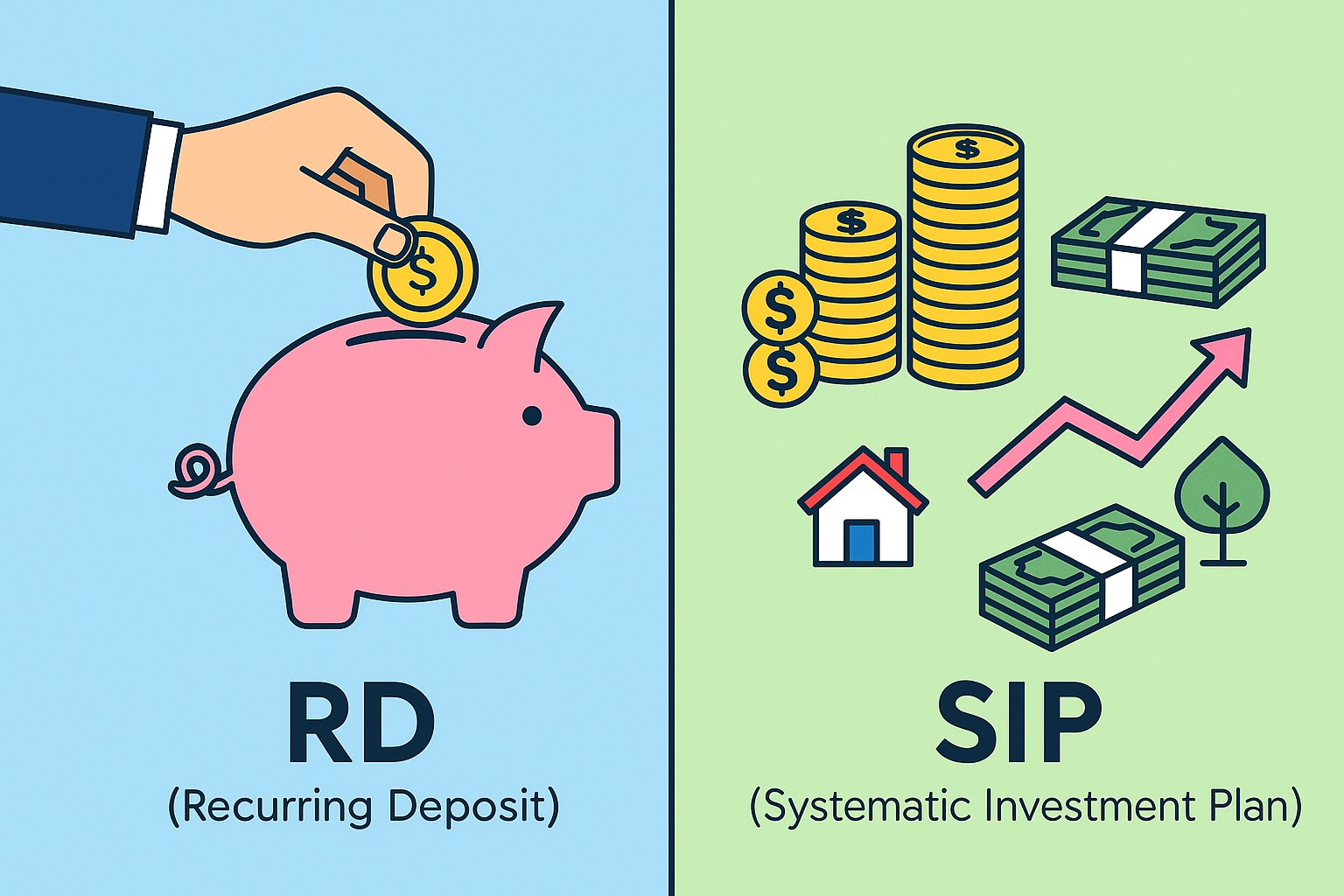Investing your money wisely is a crucial step towards achieving your financial goals. Among the various options available, Recurring Deposits (RD) and Systematic Investment Plans (SIP) are two popular choices. Each has its own set of features, benefits, and risks. Understanding these can help you make an informed decision about which option suits you best.
Understanding RD and SIP
What is a Recurring Deposit (RD)?
A Recurring Deposit (RD) is a type of savings scheme offered by banks and financial institutions. It allows you to deposit a fixed amount of money every month for a predetermined period. At the end of this period, you receive the total amount deposited along with interest. RDs are designed for individuals who want to save regularly and earn a fixed return on their investments.
What is a Systematic Investment Plan (SIP)?
A Systematic Investment Plan (SIP) is a method of investing in mutual funds. With a SIP, you invest a fixed sum of money at regular intervals, typically monthly. This approach allows you to accumulate units of a mutual fund over time. Unlike RDs, the returns from SIPs depend on the performance of the mutual fund you choose, which can fluctuate based on market conditions.
Key Features of RD and SIP
Investment Frequency and Amount
- RD: You make regular monthly deposits of a fixed amount, which is decided at the start of the scheme.
- SIP: You can choose the amount you wish to invest and the frequency, whether monthly, quarterly, or at other intervals.
Interest Rates and Returns
- RD: Offers guaranteed interest rates, which are fixed for the entire tenure. This provides certainty regarding your returns.
- SIP: Returns are not guaranteed and depend on market performance. Historically, SIPs have the potential to offer higher returns over the long term.
Risk Factors Involved
- RD: Considered a low-risk investment, as it is backed by the bank and offers fixed returns.
- SIP: Carries higher risk due to market volatility. The value of your investment can rise or fall depending on market conditions.
Benefits of Recurring Deposits (RD)
Guaranteed Returns
One of the most appealing features of RDs is the guaranteed returns. You know exactly how much interest you will earn, making it a safe option for risk-averse investors.
Simple and Safe
RDs are straightforward to understand and manage. You can open an RD account with minimal documentation, and banks usually offer user-friendly online services for monitoring your deposits.
Suitable for Short-term Goals
If you have a specific short-term financial goal, such as saving for a holiday or a new gadget, RDs can help you accumulate the necessary funds within a set timeframe.
Benefits of Systematic Investment Plans (SIP)
Potential for Higher Returns
SIPs have the potential to generate higher returns over the long run, especially when invested in equity mutual funds. The compounding effect of investing regularly can significantly grow your wealth.
Flexibility in Investment
SIPs offer flexibility in terms of investment amounts and frequency. You can start with a small amount and increase it as your financial situation improves.
Long-term Wealth Creation
Investing through SIPs is ideal for long-term goals, such as retirement or funding your child’s education. The earlier you start, the more you can benefit from the power of compounding.
Comparing RD and SIP
Risk vs. Reward
When comparing RD and SIP, consider your risk tolerance. RDs are safer but offer lower returns, while SIPs can yield higher returns but come with increased risk. It’s essential to evaluate your comfort level with investment risks before deciding.
Liquidity and Accessibility
- RD: Generally, RDs have a lock-in period, meaning you cannot withdraw your funds before maturity without penalties. This can be a disadvantage if you need quick access to your money.
- SIP: Offers more liquidity. You can redeem your mutual fund units partially or fully whenever you need, subject to market conditions.
Tax Implications
Interest earned on RDs is taxable as per your income tax slab. On the other hand, SIPs in equity mutual funds held for more than a year qualify for long-term capital gains tax, which is generally lower than regular income tax rates.
Choosing the Right Option for You
Assessing Your Financial Goals
Before deciding between RD and SIP, think about your financial goals. If you aim to save for a short-term expense, an RD may be more suitable. However, if you are looking to build wealth over the long term, a SIP could be more advantageous.
Understanding Your Risk Appetite
Your willingness to take risks plays a vital role in your investment choice. If you prefer a safe and predictable return, RDs are the better option. Conversely, if you are comfortable with market fluctuations and have a longer investment horizon, consider SIPs.
Time Horizon for Investments
The time you plan to invest is crucial. RDs are typically for short to medium-term investment horizons, while SIPs are more suitable for long-term goals, allowing your investment to grow and weather market volatility.
Conclusion: Making an Informed Decision
In conclusion, both Recurring Deposits and Systematic Investment Plans have their unique advantages and disadvantages. By evaluating your financial goals, risk tolerance, and investment time horizon, you can make a well-informed decision that aligns with your needs. Whether you choose the safety of an RD or the growth potential of a SIP, the key is to start investing early and consistently. This approach will help you build a brighter financial future.
